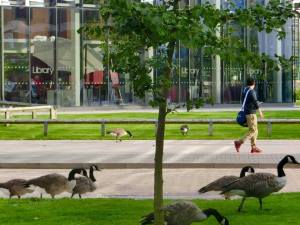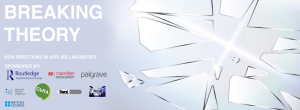The TLANG team were there in force for the British Association of Applied Linguistics (BAAL) 2015 Annual Meeting at Aston University, Birmingham. The team particularly enjoyed the strong ethnography strand which appeared to run throughout the conference, despite the dominance within applied linguistics of other methodologies such as discourse and corpus analysis.
Caroline Tagg, Piotr Wegorowski and Jessica Bradley provide their perspectives on the conference, with a particular focus on linguistic ethnography.
Caroline:
TLANG’s Angela Creese and Adrian Blackledge started the conference with a plenary talk titled ‘A theory of signs in two city meeting places’ in which they discussed some of the data collected by the project in Birmingham. Perhaps the most striking feature of their talk was its multivoicedness. The talk started with videos in which two key participants (a Chinese butcher and a Hong Kong librarian) introduced themselves in their own words, and it finished with a video of market-stall owners in Birmingham discussing the impact of increasing diversification on their work and the way in which they appropriated resources (such as learning bits of other languages) to satisfy their new and varied customers. Angela and Adrian described in more detail how both the butcher-stall owners and the librarian drew on difference as a resource for signalling affiliation and getting things done, with for example the librarian performing her full repertoire of limited Spanish in order to engage a confused yet obliging Brazilian customer.
Fiona Copland’s paper in the colloquium ‘Linguistic ethnography: new directions in imagining, theorising and practising applied linguistics?’ described her journey from discourse analyst to ethnographer in the course of a research project exploring teacher feedback. She showed how ethnographic methods proved necessary for a fuller understanding of classroom interactions, drawing on an instance in which a student’s act of subversion (responding ‘no’ to a request to give feedback) is interpreted differently by the participants involved. Asked how she resolved these differences in opinion, Fiona suggested that it was not necessarily a case of finding a resolution but in allowing the different voices to speak, a position that resonates with the TLANG research. The subsequent paper by Angela Creese explored the multivoicedness of team research further by exploring vignettes written by team members in a complementary-school research project, highlighting the way in which research processes and outcomes are shaped by the different backgrounds, assumptions, and positionings of the researchers involved. Research vignettes are also a key research tool for the TLANG project. Finally, TLANG’s Frances Rock brought together some of the disparate research contexts she had encountered through the lens of ‘explanations’, exploring the extent to which ad-hoc explanations of the police caution might have parallels with explanations given by shopkeepers regarding their ware. The talk raised questions as to how ethnographers might make sense of their large, complex data sets in ways that allow them to suggest generalisations and contribute to wider themes.
On a different yet complementary note, TLANG’s Adrian Blackledge took to the stage in his role as Birmingham poet laureate for an early morning poetry reading. His poems – which touched on both world wars, Japanese whisky, the nostalgia of newborn babies, eels, and Malala Yousafzai – were a poignant reminder that language is not only the object of scientific study but also the expression of human emotions and values; and of the fluid boundaries between disciplines such as creative writing and applied linguistics. We also learnt that audiences at poetry events are to keep their clapping to the end.

Jessica:
There was a strong TLANG presence both among the speakers and within the audience of the Linguistic Ethnography Special Interest Group (SIG) strand on Friday. This represents one of the largest SIGs and interest in this area of research is growing.
The papers during the morning session demonstrated the diversity within this approach and included research by Hania Salter-Dvorak, whose work focused on two students and their experiences and practices of proofreading. In Hania’s paper, entitled ‘Proof-reading…it’s a bit of a murky area isn’t it?’, she discussed her study on L2 master’s students which was carried out over a 13-month period and for which she used ethnographic methods including interviews and student self-reports.
Rachel Heinrichsmeier presented her doctoral research around the importance of appearance to older women, describing her methodology and an analysis of her findings so far. Her ethnographic approach involved gathering data from extended periods of observation in a hair salon and linguistic analysis of interactions between the clients and the hairdressers. Taking a linguistic ethnographic approach to a study of this kind demonstrates its interdisciplinary potential, and of particular note was the sometimes conflicting nature of the data collected. Rachel explained how the data collected through interview could be analysed more fully and in a more critical way because of the long-term ethnographic observations that she had carried out.
Chisato Danjo’s fascinating work on the language ideologies within Hoshuko, Japanese supplementary schools in the UK combined Critical Discourse Analysis and a methodology drawn from linguistic ethnography. Findings from Chisato’s research, which explored the unacknowledged language practices within these institutions, were presented and made a strong case for how the rich contextual description obtained through ethnographic methods can add to a study of this kind.
The final paper within the first morning session was by Sara Atkins, and explored the potential challenges faced by the linguistic ethnographer in terms of positioning. Sara drew from her experience working in a healthcare setting and the complexities of the relationships between the researchers and the practitioners. This focus on the relationship between the researcher and the researched was welcomed, as the researcher’s role and remit does not always align with that of the organisation with whom they are working. Reflexivity around this is crucial and Sara raised important questions around the impact agenda and its implications for applied linguists.
Piotr and fellow Cardiff postgraduate student Jaspal Singh’s joint paper focused on translation zones and translanguaging spaces within their own doctoral fieldwork in quite different settings: Piotr is working with PCSOs in Cardiff and Jaspal’s ethnographic research is on Delhi’s hip hop scene. Using empirical data from their respective studies, Piotr and Jaspal foregrounded the interactions between ‘expert’ and ‘lay’ participants and the role of performance within these.
Piotr:
In addition to an array of excellent papers forming part of the Linguistic Ethnography Forum track, the ethnographic dimension was felt throughout the conference. TLANG’s presence was further reinforced by Jessica, who presented a paper with her colleague Lou Harvey on the topic of researching performance and performing research. They asked a number of questions around telling research stories as well as engaging research participants in the research process. It is a matter very close to TLANG’s agenda, as we try to give voice to our research participants and let them play a very active part in the research process. The paper also resonated with the project’s ambition to combine arts and research, a prime example of which is the film Voices of Birmingham Bullring market.
Some of the papers did not invoke linguistic ethnography directly but clearly adopted an ethnographic perspective. For example, as a part of a colloquium entitled ‘Language in/as business’ Erika Darics talked about her experience of working as a language consultant for a charity. She stressed the need for detailed observation of actual language practices within a given setting and argued against businesses using handbooks of communication based on assumptions about language rather than detailed linguistic analysis. In her work, she observed the workplace practices, analysed internal and external communication, including telephone calls and tweets, and carried out interviews with members of staff. Her findings helped improve the organisation shape a coherent image with a view to increase the amount of funds raised. As the TLANG project made business as one of its four themes, the call for a holistic approach to language use was very much appropriate.
Finally, we would like to extend our warmest congratulations to Li Wei and Ophelia García, who were awarded the BAAL Book Prize for their Translanguaging: Language, Bilingualism and Education, published by Palgrave. Congratulations also to Leeds postgraduate student Khawla Badwan (supervised by TLang Co-Investigators James Simpson and Mike Baynham) who won the prize for best postgraduate paper for her work on Arab academic sojourners’ trajectories in the UK.
